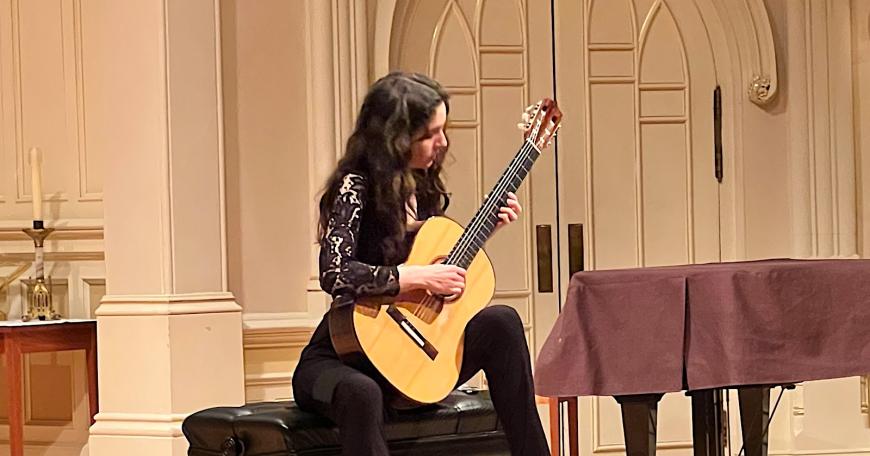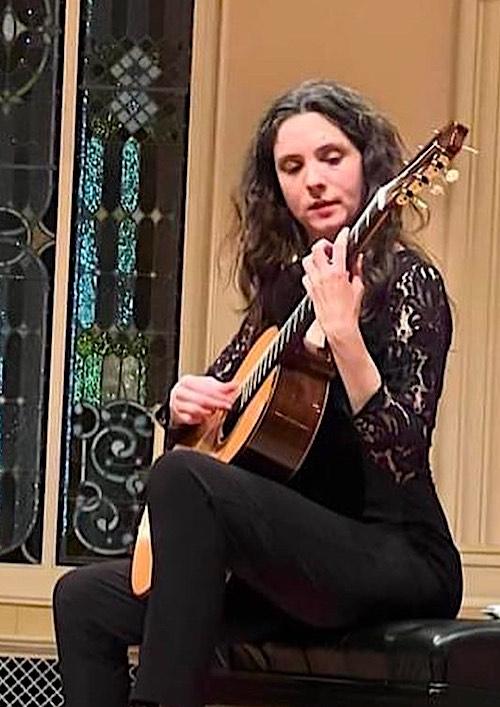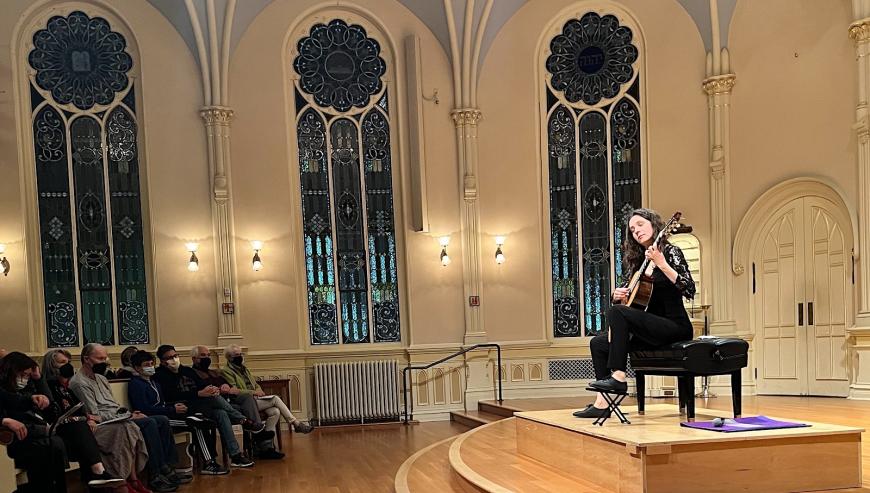
British-French guitarist and composer Laura Snowden, a rising star in the international classical guitar world, made her San Francisco debut on Saturday at St. Mark’s Lutheran Church presented by the Omni Foundation and San Francisco Performances. After winning a scholarship provided by the Rolling Stones, Snowden became the first guitarist to graduate from the prestigious Yehudi Menuhin School. Mentored on graduation by the legendary Julian Bream, she went on to give world premiere performances of music by Julian Anderson and Olli Mustonen in much lauded concerts at London’s Wigmore Hall.
Snowden is a sensitive artist who makes exquisite use of her instrument’s colors while always working to make the dramatic arc of each composition vivid. For me, the high point of the evening was her performance of the Five Preludes by Heitor Villa-Lobos. These exquisite portraits are frequently excerpted, but Snowden made a persuasive case for treating them as a unified whole. Speaking to the audience, she revealed Villa-Lobos’s unpublished subtitles which labeled the pieces portrayals of various aspects of Brazilian culture.

Prelude 1 was a poem to the beauty of the Brazilian countryside and Snowden’s sensitive attention to vibrato and dynamics brought it to life. In Prelude 2, “Homage to the Rascals of Rio,” she made full use of the composer’s indications for tempo variation to create a playful and humorous atmosphere. Prelude 3, Villa-Lobos’s very personal homage to the music of J. S. Bach, is the heart of this set in the same way that a Bach Sarabande is often the emotional core of a Bach Suite. Snowden was unafraid of the emotional intensity and was uncommonly able to maintain the long line in the very slow tempo.
In Prelude 4, dedicated to the Brazilian Indians, she used a wide color palette to bring a sparse but expressive single-line melody to life and in the later middle section she used stunning virtuosity to portray the untamed jungle wilderness. In Prelude 5, Brazilian Social Life, her unfailing rhythmic sense created an urbane portrait of the waltzes of Rio de Janeiro circa 1900 and provided a joyous conclusion to the set as a whole.
The program featured two other dances, “Tarantelle” by Johann Kaspar Mertz, and Vals Opus 8, No. 4 by Agustín Barrios. Chopinesque in its romantic beauty, the waltz was written in Brazil around 1919 and reminiscent in its urbanity of Villa-Lobos’s Prelude 5.
The other major work of the evening was the Sonatina by Lennox Berkeley, a highly varied work in the neoclassical style of Stravinsky and written for Julian Bream in 1957. Snowden’s interpretation, using a variety of color and a sensitive attention to detail, was elegant.
The guitarist is also a fine composer whose works have been commissioned by the Birmingham Symphony Hall, the International Guitar Foundation, and the VIDA Guitar Quartet. She effectively incorporated four of her compositions throughout her program. This Changing Sky is a meditative piece which makes excellent use of guitar effects: mixing harmonics and natural notes, mixing open strings with notes fingered high on the guitar neck, chordal and tremolando textures, and, at the moment of peak intensity, incorporating a melody hummed and sung by the guitarist.

Home is an homage to Julian Bream that uses a Scotch snap rhythm and an unusually delicate texture to portray Bream’s loving attention to the details in music as well as in his garden and personal relationships. The strange world of spiders used a wide variety of special effects — a partial capo, playing on both sides of the capo, playing notes by hammering left hand fingertips on the strings without the use of the right hand, and playing glissandi with a bottleneck, like an American country blues guitarist. The effects help convey the strangeness of looking at spiders outside a window in eerie light and fantasizing about an alien invasion. Song for Maria was a heartfelt melody dedicated to the composer’s sister.
Snowden is an outstanding performer whose interpretations of well-loved classics captivated the audience. Her original compositions added a special element to the concert that no one else could have brought. It was a pleasure to hear her play.






